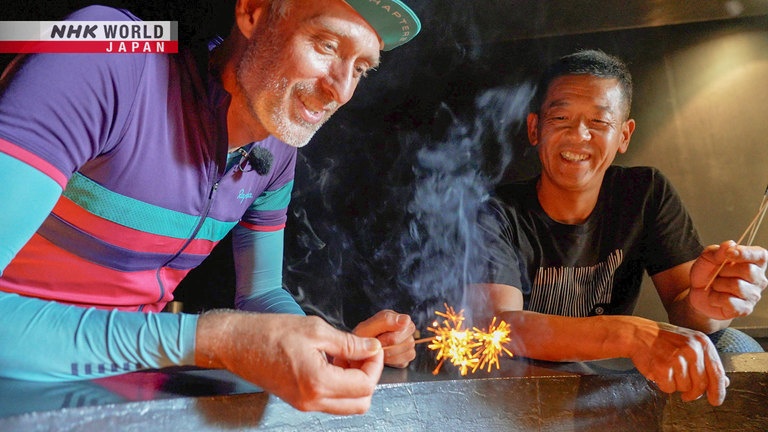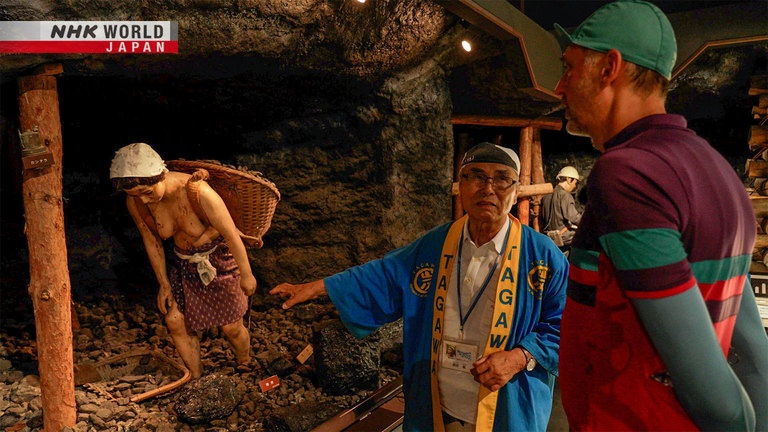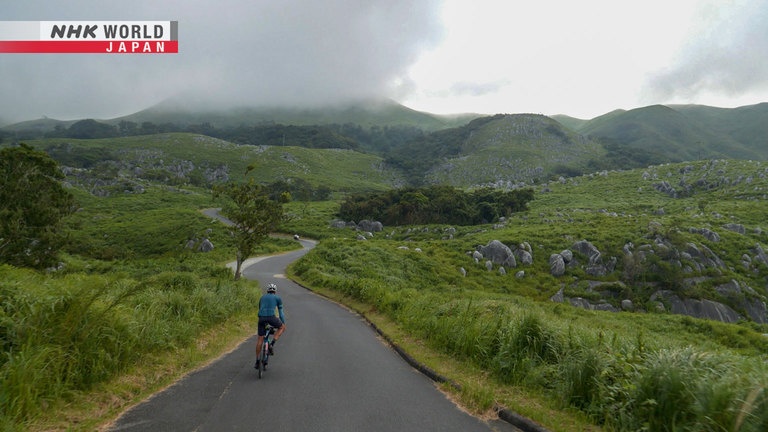Fukuoka - Always Thinking Ahead
Historically the gateway to Asia, Fukuoka Prefecture is where Japan's rice-growing culture began. We'll meet organic farmers, traditional fireworks makers, and the last of the area's coal miners.



Transcript
The best way to discover little-known sights and make even familiar places feel brand new, is to go exploring by bicycle.
This time, we're exploring Fukuoka, since ancient times Japan's gateway to the rest of Asia.
This is a landscape shaped by human activity.
It's also a land with a troubled history, hardships remembered to this day.
This landscape was created by the work of my family,
so for me the land itself is family too.
Tagawa miners died to make Japan wealthy.
We must never forget their contribution.
What a beautiful summer day.
Come with us now, on a 400-kilometer ride through Fukuoka.
It's a two-hour flight from Tokyo to Fukuoka City.
We start our ride from a legendary prehistoric site.
This place here, they say it's the place where rice farming started in Japan.
And that's amazing because rice farming is so integral to the Japanese culture.
Our cyclist, Michael Rice, is from Colorado in the USA.
A competitor in international triathlons, Michael's life revolves around cycling.
This really is a major city.
But you'll be amazed at how quickly we get out of the city and along the coastline.
Fukuoka gets a lot of rain in summer, caused by moist winds off the sea.
I hope this is about the last of the rain.
Three hours riding has brought Michael to the Itoshima Peninsula.
Not far from Fukuoka City, it's known for its fine beaches and lush forests.
Finally, the rain has stopped.
Look at these beautiful flowers.
The rain brings these flowers. Wonderful.
Itoshima has been a fertile farming area since ancient times.
Michael has come to meet a couple who are preserving the region's traditions.
- Hello! It's a great view.
- Yes, it is. It's nice isn't it?
Ogushi Yukio and his wife Kazuko run a tourist farm here in Itoshima.
They try to keep the land as close to its natural state as possible.
This eggplant really is long.
That's what the name naganasu means.
So many kinds.
- You can just eat this right off the plant.
- Really? I usually don't like green peppers.
But this is so sweet.
Why are these peppers so sweet?
There's no bitter aftertaste at all.
They're the real thing - organically grown.
In recent years, as farmers age and lack successors, much farmland in Itoshima has fallen into disuse.
Originally, Yukio was an architect, and Kazuko ran a restaurant.
Unable to stand by as the countryside turned into a wasteland, they took over this farm 14 years ago.
After years revitalizing the soil, they're finally satisfied.
What did it feel like, your first harvest?
We were so happy,
we just stared at each other and cried.
I was saying something like "We did it!"
We were just grinning at each other.
People have farmed here for centuries.
We're standing right where they worked.
They try to farm according to the natural methods of the past.
When the rice is ready to harvest,
a wind always starts to blow across the field.
The rice stalks shake in the breeze.
I think of it as a message from our ancestors,
the ones who first planted rice here.
- Thanking you for continuing their work?
- Exactly!
Michael gets to taste their rice, topped with umeboshi plums and a special homemade miso.
Thanks for all your help today!
Oh, the miso is delicious.
This rice is really good.
It's from the field we just came from.
I haven't eaten a rice ball in ages.
Michael is now riding south, following the Chikugo River.
Wow, this is a big river. Really wide.
Definitely one of the wider rivers in Japan.
Michael has now come to Miyama.
It's so hot and humid.
The sweat's just dripping off me.
There's no place to get a drink.
Gotta look for a vending machine.
Ah, a vending machine. Got it.
Finally found a vending machine.
It's not just drinks, there's something else.
What are those? Fireworks?
Yes, he's found a fireworks vending machine.
Hello!
- I see all these fireworks. Do you make them here?
- We do.
Tsutsui Ryota is the third generation of a family that has been making fireworks for almost 100 years.
Tsutsui's fireworks are all handmade in the old way.
As well as the traditional kinds, he has many innovative designs, perfect for gifts and souvenirs.
Subote Botan are an old type of Japanese handheld firework made of rice straw tipped with gunpowder.
Is it OK to go in?
Light the end and hold it
pointing slightly up for the best effect.
It's better in a breeze, to raise the temperature.
Watch what happens when I blow.
You get different effects depending
on the weather and the strength of the wind.
It's my first time to do this type.
So at first it's like a big fire, and you think OK and then it's going to be over.
But then it's not over, you can blow on it.
Wow, it's really pretty.
It's fun!
Really fun!
Tsutsui is the last remaining maker of Subote Botan fireworks in Japan.
This is it.
I'd never expect fireworks to be made from this.
I strip the outside off to leave just the core.
- The strongest part.
- Right.
- Isn't there a machine to do this?
- No, we have to do it all by hand.
The area's other fireworks companies were gradually driven out of business by inexpensive imports,
and today Tsutsui's is the only one left.
Everyone knows these fireworks,
and we don't want to let them die out.
I think the effort is worth it.
This is my field where I grow the rice I need.
To ensure supplies of straw for making fireworks, six years ago Tsutsui began growing his own rice.
As long as we keep farming rice, we should keep
making these traditional handheld fireworks.
It's a part of Japanese culture that
I'd like people around the world to know about.
These fireworks bring people closer together.
And as they burn to the end, we get even closer.
Michael is now riding north.
Oh, look at those! There are watermills there.
We've now arrived at Tagawa.
Look at those, what are those, big chimneys?
Oh, there they are! Those are big.
Oh, look at those.
Hello. Are you a local guide?
That's right.
The chimneys were part of the steam
machinery of this coal mine.
The elevator for miners
and coal was powered by steam.
- That's amazing.
- They are 45 meters high.
Harada Iwao is a guide for the museum preserving the history of this coal mine.
Starting in the 1890s, large-scale coal mining here in the Chikuho region
was a significant contributor to Japan's modernization.
Harada keeps alive the miners' traditional songs about their work.
"The moon came out."
"Over the Mitsui Coal Mine."
"Its chimneys are so high."
"Their smoke reaches the moon."
You never know if you'll get home that day.
In such harsh conditions, people make songs to
cheer themselves up, to keep going.
I think that's why this song sounds cheerful.
Coal mining was a job full of dangers.
Both men and women risked their lives working in these underground tunnels.
My grandmother did this kind of work.
She died in a cave-in,
when my father was just 7 months old.
Here's a song that goes like this.
"On a lonely night in the rain."
"A father cradles a baby under his umbrella."
"Don't cry, my little boy."
"Nothing can bring back your dead mother."
Harada's father Kuniji.
Like his parents before him, Kuniji spent his whole life working underground.
Japan eventually began replacing coal with oil for its energy needs,
and in the 1970s the area's mines closed.
After high school, Harada became a miner too,
but seeing how the times were changing, he left after just one year.
He said I was doing the right thing by getting
completely away from the mining life.
He had seen friends die down there
and knew all the hardships of working in the mines.
I think he really didn't want his son to spend
his life doing the same as he did.
Now over 80, Harada keeps the memories of the old miners alive,
singing their songs and relating their history at local schools.
Many died in Tagawa coal mines so that
our country could grow and prosper.
I want to make sure people don't forget them.
Michael is heading towards Kitakyushu, in the north of Fukuoka.
Come on views.
Give me some energy for the rest of this climb.
After fifty minutes of solid climbing, the scenery begins to open up.
Almost up to the views.
Oh, look at these views.
Oh, beautiful.
Through the forest and into the rocks.
Ah, look at all these rocks.
I wonder who put all these rocks here?
Hiraodai is a limestone plateau.
These rocks, formed on the sea floor 350 million years ago,
have been eroded over millennia into a mysterious landscape.
Waiting for Michael are two Hiraodai nature guides.
Hello. I'm Michael.
Hi, we're the Nishinakas.
Have you always lived here?
My family have been here
since my grandfather's time.
I came here when we married,
5 years ago.
Akane and Koji guide visitors on treks over the karst plateau.
Another strange shape.
Looks like someone stacked these rocks up.
This is interesting.
This didn't start off as rock.
It was all originally sea creatures.
Sea creatures?
Corals and other calcium-shelled creatures
died and accumulated on the sea bed.
Eventually all this calcium turned to stone.
This rock we're looking at originated
millions of years ago, and now it's on the surface.
- The history of the earth, right there.
- It really is a miracle.
Each spring, we burn off the vegetation.
The grasses that died off in winter catch fire easily,
and then we let everything else burn.
In Hiraodai, people have been doing these controlled burns for hundreds of years
to eradicate pests and maintain the grasslands.
Many outsiders settled here after World War II, and they continued the custom of annual burns.
Koji and Akane introduce visitors to this area that Koji's family helped to settle.
This kind of landscape doesn't endure in nature.
Forests always take over.
It's often called natural scenery,
but it's really a collaboration between man and nature.
In a way, acting as nature guides
to a unique landscape makes us pioneers too.
Our grandparents and parents nurtured this landscape,
so I think of the land as my family.
Because it's family, we have to protect it.
Michael is now getting close to his goal.
OK, I'm gonna work up a sweat, here I can tell.
Wow, this is a wall.
Now, that's steep.
I've done like 50 episodes but this is the steepest, the steepest goal scene I've ever done.
Wah, even steeper.
OK there it is.
So I walk from here.
The wind up here is really strong.
Made it to the end of Fukuoka.
Michael has finally reached his goal, a point looking down over Kitakyushu City.
This time, what really struck me was the optimism of the people.
They're really optimistic about that they can just do it.
That they can just decide "OK, I'm going to protect these things,"
and make sure they're going to be carried on for future generations.
And so whether it's the historic songs or whether it's the beautiful scenery of the mountain tops,
whatever it is they feel is beautiful and want to carry on for future generations.
And so that optimism of the people in Fukuoka is what really struck me,
and what I really take home in my heart from this trip.
Times change, lifestyles change, but the landscape remains an eternal presence.
And nothing will ever change the Fukuoka passion for life.